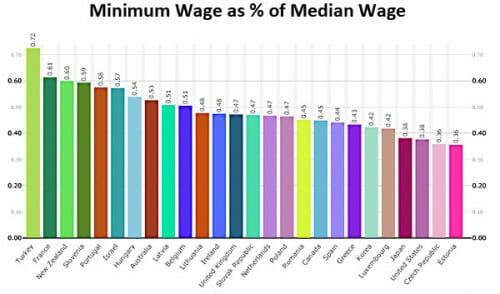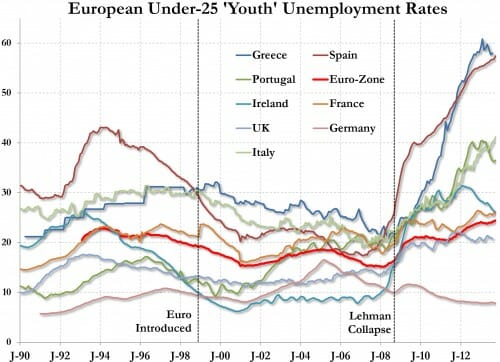In part 1 of this series, I didn't talk much about the "global test" but rather spent some time giving my views on the war in Iraq. In brief, I opposed this war, but for reasons very different than that of most anti-war activist. I appreciate the need for the US to use force in the world from time to time, not the least for the quite salutary effect it can have on other miscreants who foresee that they might meet with the same fate (e.g.m see "Lybia").
One argument that I did not ever find compelling was the fact that we did not have enough allies or a large enough coalition. First, those putting forward this argument tend to go so overboard that they tend to insult those who did join us as "coerced" or "bribed". I think we owe a lot more to countries like Great Britain, Australia, Poland, Italy, and Spain (v1.0) than to intimate that they were suckers to join us. And what's with the strategy of saying that we did not have a large enough coalition, then actively trying to reduce it?
My hypothesis from day 1 of the war was that France was an ally of Iraq, and never going to join us, but that it didn't matter one way or another because alliances in the Muslim world would be much more important than with countries of fading glory in Western Europe. Therefore, the rest of this post will address two issues:
1. How realistic or unrealistic it was to expect help from our "traditional allies" and
2. Our mixed record of success with the allies that may matter more
Germany and Japan
Germany and Japan spent much of the 20th century unsuccessfully attempting to export totalitarianism to their neighbors by force. Both countries are rightfully reluctant to send their forces on cross-border adventures (in fact, Japan in prohibited in doing so by the constitution the US wrote for it). I have no problem with both countries taking a 100-year or so timeout on foreign adventurism.
France and Russia
The evidence continues to flow in. France and probably Russia were active allies of Saddam and the Baathist dictatorship in Iraq. Period. No amount of diplomacy, short of maybe a nuclear threat, was going to cause them to support an invasion of Iraq. They were no more likely to join in on an attack on Iraq than Mussolini and Italy were likely to join the Allies in WWII against Germany. The evidence emerging includes:
1. France and Russia were given a deal not long before the war to split the development rights to all of the oil in Iraq. Though it was not known then, the Duelfer report shows this to have been a direct strategy of Saddam to gain their security council vetoes. MSNBC had an article BEFORE THE WAR discussing the deal with France and Russia. Incredibly, America Haters, and even the author of this article, spend more time talking about the US going to war in Iraq for the oil. There has never been a scrap of evidence that the US went in for the oil, and very clear evidence that France and Russia were given lucrative oil deals to prevent the invasion. So who was acting for the oil?
2. France and Russia were easily the largest arms suppliers to Iraq. We knew this before the war and we have confirmed it in spades today. Every day our troops get attacked by French weapons, most of which were shipped to Saddam AFTER the embargo was in place and many within months of the start of the war. Iraq is not the only place where this is happening. While the US has in the past been careless or outright irresponsible in some of the places its weapons have ended up, today France, China, and Russia are not the key arsenals of totalitarianism.
3. France and Russia were key enablers in the UN, both passively, by defeating safeguards, and actively, by playing a direct role, of Saddam Hussein's stealing billions of dollars from the oil for food program. This story is still unfolding, and at this point I will leave aside the payments of oil vouchers to individuals, because it is not clear whether these acted as bribes (though they sure look like them). However, even without this aspect, the rape of the oil for food program is a miserable story of corruption, as detailed in part here and here.
The Scotsman has been on top of this story, and has a couple of great articles here and here.
Other Nations?
What about other nations. China? Yeah, right, the boys from Tiananmen square love promoting democracy over totalitarianism. Their actions to protect the Sudanese government from criticism over the current genocide there (again, in part, to protect their oil rights) have shown their true colors. And who else is left? Send in the Peruvian Air Force? The answer is, no one who could really help. When people say that we did not have a coalition, they primarily mean France, and you can see how likely that would have been. As an aside, I find it incredible that liberals of all stripes want to align themselves with French Foreign policy, perhaps the most illiberal in the last 50 years of all the wester democracies and certainly the country most responsible for making colonialism a bad word.
Allies that Really Matter in this War
In attacking Afghanistan and Iraq, the allies that should really matter are its powerful neighbors. I would argue that Pakistan, Turkey, Saudi Arabia and Indonesia are all more important allies in these wars than France. So how have we done with these countries - the answer is a mix of successes and failures.
In Pakistan, we probably have had our greatest diplomatic success. Certainly, on 9/12, as we were trying to decide what to do next, Pakistan seemed to be more of a problem than part of the solution, and certainly their nuclear program was worrisome. But the Bush Administration has done a good job at turning Pakistan into an ally (at least in the near-term), with Pakistan agreeing to base troops and fighters in the country, agreeing to renounce ties to the Taliban, and, perhaps most amazing, agreeing to actually use its troops and security personnel to help hunt down hiding Taliban members. Without Pakistan on our side, defeat of the Taliban would have been impossible, with Pakistan acting as a safe harbor for terrorists much like Laos and Cambodia did in the Vietnam war. Even better, all this has been achieved without ruffling too many feathers in India, which is in itself a diplomatic victory, similar to wearing a Yankees shirt in Fenway Park and not starting a fight. I know that Pakistan still has a ton of problems, but we are getting as much as we could ever expect from them in the near-term (heck, even allying with Stalin made sense for a few years get reach some key goals).
In countries like Saudi Arabia and Indonesia, we probably reached about a diplomatic draw. Neither country would be highly enthusiastic about either an invasion of Afghanistan or Iraq, but both provided at least modest logistics support. Neither, however, have ceased being tremendous breeding grounds for terrorism or have done much to deter those in their countries supporting terrorism. Certainly a reckoning is coming sometime in the future with Saudi Arabia, but, for now, they have been about as supportive as necessary (and no more).
It is difficult to paint our diplomatic efforts with Turkey in the run-up to the war as anything but a failure. Turkey clearly had many concerns about the war, from negative economic impact to encouraging their own Kurdish minorities to get frisky should Iraq's Kurds gain their freedom. However, given our good relations with Turkey over the last half-century, we should have been able to find a diplomatic formula to secure their cooperation. Even more, our failure was particularly deep given that Turkey's support seemed to fall apart at the eleventh hour, when these type of things should already have been worked out.
In Summary
It still flabbergasts me that so many people run around worrying about France's participation in our alliance. It strikes me that France's participation was both stupendously unlikely as well as of little practical value (beyond their UN veto). Much more important was our success with Pakistan and failure with Turkey. A new type of war in different parts of the world will require different alliances than the European wars of the 20th century.
UPDATE
Interesting post from Captains Quarters about the complicated nature of our relationship with Pakistan and the change in Al-Qaeda strategy to try to drive Pakistan out of its alliance with the US.


